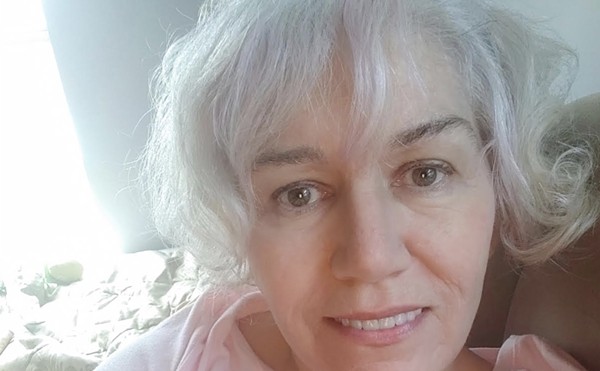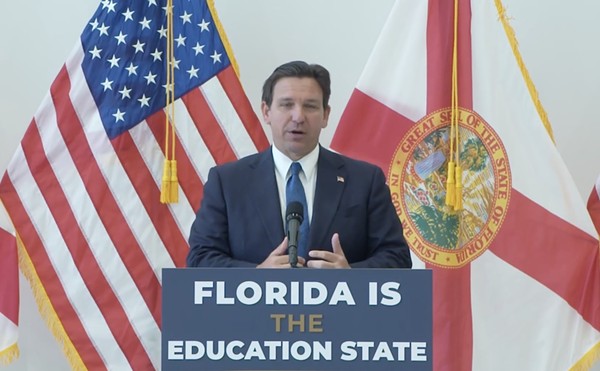The No Child Left Behind Act of 2001 is, in terms of sheer volume, huge. Average readers would need a whole week and a stiff drink to get through all 670 pages of the desert-dry legislative language. The hard copy of the law feels like a telephone book and the digital copy, available online at www.ed.gov, takes nearly 15 minutes to download. It's little wonder then that section 9528, just a few paragraphs entombed on page 559 of the law, has gone largely unnoticed.
The small provision requires high schools receiving federal funding to provide student directory information (name, address and telephone listing) to military recruiters upon request. Parents can remove their children from the list available to recruiters only if they put a request in writing; in other words, the default is that their information will go out.
It's an opt-out policy, rather than an opt-in one.
All of this, of course, requires that parents know about their option to opt out, and section 9528 states that schools must notify parents. While all local school districts comply with the notification policy, the law says nothing about how schools must go about doing it, allowing Central Florida districts to bury notifications under a pile of take-home papers or slide them into the middle of student conduct books. The result is that few Central Florida parents have opted out.
ANTI-MILITARY ATTITUDE
David Vitter, a Republican senator from Louisiana, attached 9528 to the bill in 2001 after hearing from the Pentagon that many schools were not handing over student information to recruiters. He said at the time he was offended by the "anti-military attitude" these schools displayed.
What Vitter terms "anti-military," many call respecting privacy, and school districts in anti-war pockets of the country have fought back. Schools in San Francisco and Santa Cruz, Calif., have placed the notification on the emergency card, which has to be filled out and returned. Other districts – New York City is one – allow students (including minors) to opt themselves out, and Los Angeles schools only release 11th and 12th grade students' information to recruiters.
If it were up to California Democrat Rep. Mike Honda, opting in would be the norm. He introduced the Student Privacy Protection Act of 2005, which requires a parent's consent before a child's information can be released. It has been stalled in the Republican-controlled House Commit-tee on Education since March.
Both the national Parent Teachers Association and the National Education Association support changing section 9528, and www.leavemychildalone.org has received more than 31,000 opt-out cards. But even with more information getting out across the country, it's the way local districts notify parents that determines the number of opt-outs.
Eighteen percent of Orange County high school students have opted out so far this year. The low percentage might be due to the bulk of papers students bring home at the start of school. The "Public Notice of Parent Rights" letter, which has a box to check for opting out, is sent home with students along with other first-of-the-year materials such as schedules, the student code of conduct and day planners.
"I send [the notifications] home, but I send a lot of stuff home, which probably just gets lost in the shuffle. Maybe that's the problem," says Lorenzo Phillips, principal of Jones High School, where only 8 percent of students opted out.
Orange County, however, has the highest percentage of opt-outs in the area. In Seminole, Osceola and Volusia counties, 1 percent or less of their students return an opt-out form. (Lake County could not provide numbers at the time of publication.)
In Osceola County, where only 18 of the 13,601 high school students have opted out this year, the notice appears at the bottom of page 37 of the student code of conduct. Unlike Orange County, there is no box to check, no official form to return, only a line that informs parents they can notify the principal in writing of their wish to withhold student information from recruiters.
A similar notice appears on page 33 of Seminole County Public School's student code of conduct. This year 266 of that district's 20,848 high school students have opted out.
Volusia County is the only area school district to both send a letter home and put a notice in their student code handbook informing parents of their right. Interestingly, the district has the lowest number of responses, with only five out of the 20,382 high school students opting out this year (an increase over the three who opted out last year).
MANY REASONS
Schools in Florida have been providing student directory information to the military for years without permission from parents. The NCLB act changed two things: It gave the policy teeth by threatening a loss of federal funding for noncompliance, and it mandated that parents be notified of the option to remove their children's information from any list sent to recruiters.
For some administrators already accustomed to giving out student information, the notification policy is news. Although Osceola County Public Schools has a notification in the student code of conduct, John Beall, assistant superintendent for school support services in the district, only learned of the requirement when Orlando Weekly asked him about it. Paul Mitchell, principal of Colonial High School, where 16 percent of students opted out, initially told OW the form going home to parents was to opt in.
"I'm very strict about giving out students' information," he says, indicating his support for what he thought was an opt-in form.
Jay Marshall, director of student services for Lake County Public Schools, says the district has been handing out directory information to recruiters for at least 28 years.
"I've never heard a complaint from a parent, which tells me apparently people don't care about [the military having access to students' information]," he says. Marshall says his district's parents know about the opt-out policy through the student code of conduct (on page 18) sent home each year, though he admits many parents don't read it.
Like section 9528 deep within the hefty NCLB, the notifications in the student codes of conduct are hard to find, and even if parents do skim them, they could easily miss the opt-out section. Osceola County parents have to swim through 36 pages of dress codes and policies against violence before any mention of the option to opt out. The small print in the Volusia County student code has no bold words to alert parents to the notification, and the opt-out line is in the middle of a paragraph on a page that reads like a contract.
There are other issues with how some schools implement the policy. All districts looked at by OW had a blanket opt-out rule; if you opt out of making your information available to the military, your information is not available to colleges either. Also, both Volusia and Osceola schools require parents to notify principals again each year of their wish to opt out.
Within the directory information section in the Lake County student code of conduct, there's a line that reads, "In the absence of written notification to restrict the release of directory information, the school and the school board will assume that neither a parent of a student, or an eligible student objects to the release of the designated directory information."
This presumptuous clause is exactly what critics of the provision hate.
"This is just wrong," says Felicity Crush, spokeswoman for Leave My Child Alone, a group raising awareness of the little-known provision. "It's simply a privacy issue, and parents should know and have a say in who's getting their kids' information."
Pajaro Valley Unified School District in California, a small farming area not known for leftist thinking, passed a resolution that placed the opt-out notification on the emergency cards. Last year, without the policy, 16 percent of students at the district's Aptos High School opted out. This year, with the emergency-card policy in place, 63 percent opted out.
"If parents know about the option to opt out, they take it," says Crush.
Cheryl Hall, in community information services at Volusia County schools, has a senior in high school and says she didn't see her district's notification. "With the war in Iraq going on I might have opted out my son if I'd known," she says.

















